Dai Haiwen, Jose Recatala-Gomez, Zhu Ruiming, Maung Thway
Nong Wei, Andy Paul Chen, Zhang Chenguang, Kedar Hippalgaonkar
School of Material Science and Engineering, Nanyang Technological University, 639798, Singapore
Institute of Materials Research & Engineering, A *STAR, 138634, Singapore
EXTENDED ABSTRACT: The evolution of data-driven methodologies within confined chemical or structural spaces has sparked a revolution in materials discovery from conventional approaches. Material exploration now extends beyond limited elemental or chemical space, exponentially increasing the chemical complexity. This study introduces a comprehensive evaluation framework integrating machinelearning synthesizability, charge probability, reaction pathways,and thermodynamic stability, which are subsequently verifiedthrough high-throughput experiments. Our framework efficientlyranked candidates from a set of testing ABO3 compounds basedon weighted scores, positioning synthesized compounds amongthe top, even those absent from the training dataset, such asVNiO3 and VCo03.Unsynthesized ZnVO3 and YMo03 wereproposed and further verified with reasonable stability withenergy over hull of 54 and 30 meV/atom. Leveraging uponhigh-throughput ultrafast sintering, verification of one synthesiscondition was completed within ten minutes. Synthesis targeting YMo03 revealed a blend of phases between 1100 °C and 1700 °C. In contrast, the synthesis aimed at Zn V03 yielded pure, closely related phases, Zn3V308 or Zn2V207, as confirmed by Rietveld Refinement. By amalgamating high-throughput synthesis with multi-layer evaluation, our approach enables rapid screening of predicted candidates and synthetic pathways, paving the way for novel material discoveries.
Keywords: machine learning; inverse design; pathway planning; ultrafast sintering.
REFERENCES
[l] Dai Haiwen, et al, ACS AMI, 15(23), (2023) 28398-38409.
[2] Dai Haiwen, et al, Manuscript in preparation, (2023).

Dai Haiwen, received his bachelor's degree from University of Science and Technology Beijing in 2015, and Ph.D. degree from National University of Singapore in 2019. He worked as an Application Engineer in Carl Zeiss, and continues as Postdoctoral researcher with A/P Kedar Hippalgaonkar in Nanyang Technological University, Singapore. His research interest is highthroughput synthesis and automated characterization. He has co-authored 8 publications from reputed IEEE conferences to ACS journals.